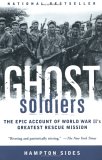Summary | Excerpt | Reviews | Readalikes | Genres & Themes | Author Bio

Critics' Opinion:
Readers' Opinion:
First Published:
May 2001, 336 pages
Paperback:
May 2002, 384 pages
All the while, Lieutenant Sato scurried from trench to trench with saber drawn, loudly exhorting his men and occasionally punctuating his commands with a high, nervous laugh. At his order, another wave of troops approached the air-raid shelters, throwing grenades into the flaming entrances and raking them with gunfire. Some of the troops poked their rifle barrels through the entrances of the trenches and fired point-blank at the huddled forms within. James Stidham, the paralytic who had been watching all of this from his stretcher, quietly moaned in terror. A soldier stepped over to him and with a perfunctory glance fired two slugs into his face.
When Lieutenant Sato was satisfied that all 150 prisoners were dead, he ordered his men to heave the stray bodies back into the smoky pits. The soldiers splattered additional gasoline inside and reignited the trenches. They tossed in more grenades as well as sticks of dynamite to make it appear as though the victims had perished in an air raid after all, with the shelters receiving several "direct hits" from American bombs. The immense pall of smoke curling from the three subterranean pyres was noted by observers five miles distant, across Puerto Princesa Bay.
Entries from Japanese diaries later found at the camp spoke hauntingly of December 14. "Although they were prisoners of war," one entry stated, "they truly died a pitiful death. From today on I will not hear the familiar greeting 'Good morning, Sergeant Major.'" Another mentioned that on the beach below the camp, the "executed prisoners [are] floating and rolling among the breakwaters." Said another: "Today the shop is a lonely place. There are numerous corpses...and the smell is unbearable."
On January 7, 1945, an officer from the Army's intelligence branch, known as G-2, sat down with a man named Eugene Nielsen, who had a remarkable story to tell. Their conversation was not casual; it was an official interrogation, and the intelligence officer, a Captain Ickes, was taking notes. At the time of the debriefing, Nielsen and Ickes happened to be on the tropical island of Morotai, a tiny speck in the Spice Islands of the Dutch East Indies that had become a crucial stepping-stone in General MacArthur's drive toward Japan. Eugene Nielsen was an Army Private First Class who had been with the 59th Coast Artillery on the besieged island of Corregidor--directly across from Bataan--when he was captured by the Japanese in May 1942. Born and raised in a small town in the mountains of Utah, Nielsen was twenty-eight years old, and three of those years he had spent languishing in a prison camp near the Palawan capital of Puerto Princesa. There he had done backbreaking work on an airfield detail, crushing rock and coral and mixing concrete by hand.
Nielsen had been evacuated to Morotai along with five other ex-POWs. He was convalescing while awaiting shipment home to the United States. Although he was racked with the residual effects of the various diseases he'd contracted while starving in the tropics, he had recovered much of his strength since his escape from prison. He had two bullet wounds which were still on the mend.
The officer from G-2 sat horrified in his chair as Nielsen told his story, which concerned an incident on Palawan several weeks earlier, the full details of which no official from U.S. Army intelligence had apparently heard before.
The trench smelled very strongly of gas. There was an explosion and flames shot through the place. Some of the guys were moaning. I realized this was it - either I had to break for it or die. Luckily I was in the trench that was closest to the fence. So I jumped up and dove through the barbed wire. I fell over the cliff and somehow grabbed on to a small tree, which broke my fall and kept me from getting injured. There were Japanese soldiers posted down on the beach. I buried myself in a pile of garbage and coconut husks. I kept working my way under until I got fairly well covered up. Lying there, I could feel the little worms and bugs eating holes in the rubbish, and then I felt them eating holes into the skin of my back.
Excerpted from Ghost Soldiers by Hampton Sides Copyright 2001 by Hampton Sides. Excerpted by permission of Doubleday, a division of Random House, Inc. All rights reserved. No part of this excerpt may be reproduced or reprinted without permission in writing from the publisher.




Not doing more than the average is what keeps the average down.
Click Here to find out who said this, as well as discovering other famous literary quotes!
Your guide toexceptional books
BookBrowse seeks out and recommends the best in contemporary fiction and nonfiction—books that not only engage and entertain but also deepen our understanding of ourselves and the world around us.